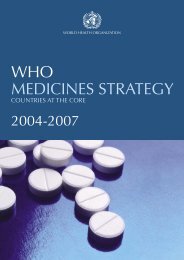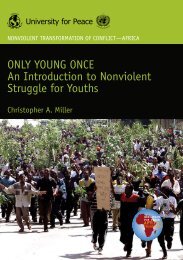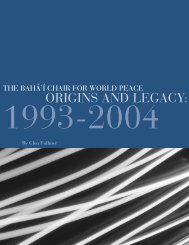environmental degradation as a cause of conflict in - Steiner Graphics
environmental degradation as a cause of conflict in - Steiner Graphics
environmental degradation as a cause of conflict in - Steiner Graphics
Create successful ePaper yourself
Turn your PDF publications into a flip-book with our unique Google optimized e-Paper software.
party had the strongest support <strong>in</strong> the Darfur region. Although party members donot necessarily have the same strong religious bonds <strong>as</strong> tariqa or khalwa followers,members <strong>of</strong> political parties still have strong ties among themselves, particularlyamong those attached to the sect. Political parties still function <strong>as</strong> a melt<strong>in</strong>g-potfor followers <strong>of</strong> different ethnic and parochial backgrounds.The Judiyya or MediationThe judiyya is a widespread system <strong>of</strong> manag<strong>in</strong>g <strong>conflict</strong> <strong>in</strong> rural Sudan. Whenever<strong>conflict</strong>s are imm<strong>in</strong>ent or develop<strong>in</strong>g, volunteers will immediately step <strong>in</strong> and playthe role <strong>of</strong> mediators. They are normally the elderly, the wise, the impartial, whoare versed <strong>in</strong> local customs and traditions. In Darfur they are called the ajawid(S<strong>in</strong>gular, ajwadi). The judiyya <strong>in</strong>stitution works to prevent <strong>conflict</strong>s, manage them,resolve them and sometimes transform the <strong>conflict</strong> situation.Over the course <strong>of</strong> time the judiyya acquired sanctity <strong>in</strong> Darfur. No one woulddare to refuse judiyya <strong>as</strong> a mechanism for <strong>conflict</strong> resolution or fail to honour itsrul<strong>in</strong>gs. To fail to be committed to judiyya rul<strong>in</strong>g, one subjects one’s self to unaffordableconsequences, such <strong>as</strong> a communal boycott, <strong>in</strong> a society where communalsolidarity is <strong>in</strong>dispensable. One would be labeled <strong>as</strong> k<strong>as</strong>sar khawatir – one whobreaks a communal norm. The judiyya can be <strong>in</strong>itiated by the ajawid voluntarily orby the parties <strong>in</strong> a <strong>conflict</strong>, who <strong>as</strong>k for mediation.In Darfur the judiyya predated the colonial era (1916-1956). But the colonialpower reformed the system when it reformed the tribal leadership, giv<strong>in</strong>g it thelabel <strong>of</strong> Native Adm<strong>in</strong>istration. Native adm<strong>in</strong>istrators have s<strong>in</strong>ce become the ma<strong>in</strong>body <strong>of</strong> the ajawid or mediators. When violence erupts among local groups, triballeaders, whose followers are not party <strong>in</strong> the <strong>conflict</strong>, will act <strong>as</strong> the ajawid. Thesystem worked perfectly well dur<strong>in</strong>g the colonial era. The prevail<strong>in</strong>g political philosophy,with its concern for the protection <strong>of</strong> life and property, greatly helpednative adm<strong>in</strong>istrators to be successful <strong>in</strong> end<strong>in</strong>g <strong>conflict</strong>s.When <strong>conflict</strong>s are with<strong>in</strong> groups or between <strong>in</strong>dividuals, the traditional judiyya(<strong>in</strong> which native adm<strong>in</strong>istrators are not <strong>in</strong>volved) rema<strong>in</strong>s the mechanism for thesettlement <strong>of</strong> disputes. The native adm<strong>in</strong>istrators would normally sanction suchjudiyya rul<strong>in</strong>gs. Up to now the traditional judiyya settles most disputes between<strong>in</strong>dividuals and groups at the gr<strong>as</strong>sroots level. When <strong>conflict</strong>s are larger <strong>in</strong> scale,<strong>in</strong>volv<strong>in</strong>g more than one tribe, a government-sponsored judiyya would be arranged,<strong>in</strong> which tribal leaders who are not party to the <strong>conflict</strong> would play a dom<strong>in</strong>ant role<strong>in</strong> reconciliation. (See Mohamed 2002).72











